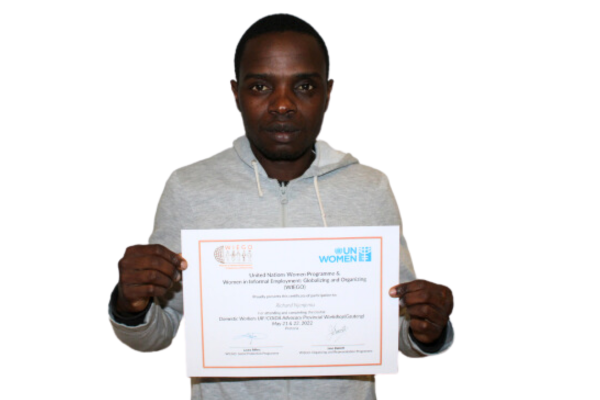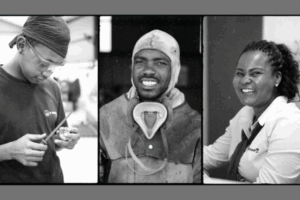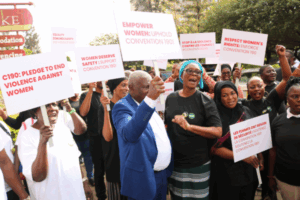Richard Njenjema (32), an organiser at the South African Domestic Service and Allied Workers Union (SADSAWU), is passionate about the need for domestic workers to have better access to the Compensation for Injuries and Diseases Act (COIDA) and the Unemployment Insurance Fund (UIF).
Why did you join a union?
I worked as a caretaker, looking after several properties in Johannesburg. I did not have a formal written employment contract or clearly defined duties for the three years I worked. For R2 300 a month, I did tasks ranging from cleaning, repairing, gardening, electrical, plumbing, administration and general maintenance. Not all these tasks were within the scope of the work agreed when I took on the job. I did the work anyway. As a migrant worker, I felt I had no choice.
In May 2016, I got injured at work. The incident marked the deterioration of my relationship with my employer and led to my being dismissed unfairly in 2018. I joined SADSAWU because the union can represent it’s members. I also wanted to be an example to men in the domestic work sector that they can and should be fully involved in our struggle for decent conditions in the workplace.
Why are you passionate about organising domestic workers?
It is important to recruit and organise because domestic work can be precarious and challenging. Workers that do not know their rights and what to do if an employer violates them are particularly vulnerable. I doubt I would have managed to take on my employer without SADSAWU. SADSAWU helped to negotiate my unfair dismissal. The union also stopped the attempts by my employer to evict me after I testified in the court case to extend COIDA to domestic workers. I want more people to know their rights, realise that there is strength in unity and that the fight to win these rights for every worker is real.
But not everyone believes that unions work. At SADSAWU we struggle to organise men and young people. Men working in the sector can be socially stigmatised, despite domestic work being a vital part of the economy. Many male domestic workers see SADSAWU as a union for women. My experience working as a domestic worker helps me to relate to men and migrants and recruit them. It’s important that we continue to campaign for domestic work to be seen as important work, which is recognised by various laws. Specific organising and bargaining strategies are needed to address the challenges of implementing, enforcing, and improving labour laws, particularly in the domestic work sector.
COIDA and UIF benefits are not always available to all domestic workers. What will it take to campaign for better access?
There is strength in unity. Domestic workers’ organisations that are committed and passionate about a shared vision for mobilising access to social insurance schemes can benefit from interventions by relevant support organisations. For example, the LRS has facilitated learning spaces for SADSAWU, the Union of Domestic Workers of South Africa (UDWOSA) and the Izwi Domestic Workers Alliance. We shared our different experiences, perspectives and ideas on what an effective UIF and COIDA should look like for domestic workers, who face many challenges in registering for and accessing these benefits, and developed a joint national campaign. The campaign is about improved access to COIDA and UIF for domestic workers. The demands include education and awareness, user-friendly systems for registration and access to benefits, and better compliance, inspection and monitoring. The campaign will be successful if all stakeholders are on board.
Given your experience with COIDA after your injury, what did you think of our workshops?
I was injured while using an electric grinder that I was not familiar with. My fingers were severed and later reattached with wires. My employer accused me of ‘trying to be fradulent’ when I said I had been advised in hospital to claim for compensation from Department of Employment and Labour. I was later dismissed for ‘resentment’ and ‘non-performance of my duties’. SADSAWU helped me file a complaint. I was privileged to belong to a union. My employer thought he could just sack me without facing any consequences.
For the UIF and COIDA to succeed, the challenges faced by domestic workers trying to access the benefits must also be addressed. The employees and employers must know about the schemes and the procedures for registration and claiming benefits.
I am glad that LRS and other organisations are committed to assist the push by domestic workers for better access to COIDA and UIF. The workshops facilitated by LRS helped us to improve our knowledge and advocacy skills to work together for the benefit of all domestic workers.
When you think back to the workshops, what stood out for you?
First of all, I have learned more and feel empowered to continue the struggle. The resources that were made available at the workshop are excellent. I have used the ‘head, heart and feet’ drawing in organising and the workers have liked it. Secondly, we were connected as representatives from different branches and unions to share our different experiences and ideas. Thirdly, we were connected to the Department of Employment and Labour through the official who came to the workshop to speak about COIDA and UIF. Before, it was not easy to approach the labour department. But since the workshop, they are a little easier to work with. A lot of the domestic workers are not registered with COIDA. We anticipate more learning spaces because the struggle continues.
RELATED ARTICLES







